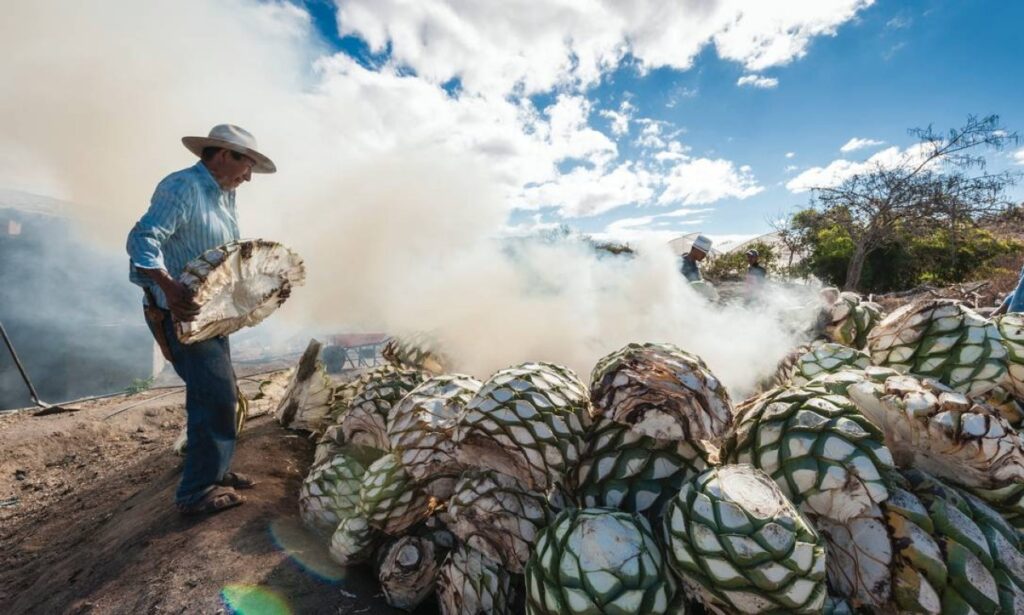
What is mezcal? A deep dive into Mexico’s traditional spirit
Mezcal is a traditional Mexican alcoholic beverage that has been gaining international recognition over the past decade. This elixir, rich in tradition and culture, is produced in nine different states across Mexico.
But what exactly is mezcal, and what sets it apart from other spirits? Let’s delve into the world of this unique drink.
— The origin of mezcal
Mezcal originates from Mexico, specifically from the region of Oaxaca. It is a distilled alcoholic beverage made from any type of agave plant, a succulent plant with spines and a slow growth rate. The word “mezcal” comes from the Nahuatl language, with “mexcalli” meaning “oven-cooked agave”. This name reflects the traditional process of making mezcal, which involves cooking the agave in earthen pits.
— The making of mezcal
The production of mezcal involves a meticulous process that starts with the harvesting of the agave plant. The “piña” or heart of the agave plant is cut and then cooked in a pit oven, giving mezcal its distinctive smoky flavor. After cooking, the agave is crushed to extract the juice, which is then fermented and distilled to produce the final product.
— Mezcal vs tequila: a common misconception
Many people often confuse mezcal with tequila, another popular Mexican spirit. While both are derived from the agave plant, there are key differences between the two. Tequila is made specifically from blue agave and is produced in the Tequila region of Mexico. On the other hand, mezcal can be made from various types of agave and is not restricted to a specific region.

— The taste of mezcal
Mezcal is renowned for its unique flavor profile. It has a slightly smoky taste, a characteristic derived from the cooking process of the agave. This smoky flavor, combined with the natural sweetness of the agave, creates a complex and intriguing taste that is unlike any other spirit.
— The rise of mezcal in the international scene
In recent years, mezcal has seen a surge in popularity on the international stage. It is increasingly appearing on cocktail menus around the world, with mixologists appreciating its unique flavor and versatility. This rise in popularity has led to a greater appreciation for the traditional methods of mezcal production and the rich culture it represents.
— How to enjoy mezcal
There are many ways to enjoy mezcal. It can be sipped neat to fully appreciate its complex flavors, or it can be used as a base for a variety of cocktails. Some popular mezcal-based cocktails include the mezcal margarita and the mezcal negroni.

— The cultural significance of mezcal
Mezcal is more than just a drink; it is a symbol of Mexican culture and tradition. The process of making mezcal is often a family affair, passed down through generations. Each bottle of mezcal tells a story of the people, the land, and the tradition that goes into its production.
— The sustainability of mezcal
With the rise in popularity of mezcal, sustainability has become a key concern. The agave plants used in mezcal production take many years to mature, and overharvesting can lead to a depletion of these plants. Many mezcal producers are now implementing sustainable practices, such as replanting agave and using organic farming methods, to ensure the longevity of this traditional spirit.
— The varieties of mezcal
There are numerous varieties of mezcal, each with its unique flavor profile. The type of agave used, the region where it’s grown, and the specific production methods all contribute to the diversity of mezcal. Some of the most common types of agave used in mezcal production include Espadín, Tobalá, and Tepeztate.

— Mezcal and food pairing
Mezcal pairs wonderfully with a variety of foods. Its smoky and complex flavor can complement spicy dishes, grilled meats, and even chocolate. In Mexico, it’s common to sip mezcal alongside traditional dishes like tacos, ceviche, and mole.
— Mezcal in popular culture
Mezcal has also made its way into popular culture. It’s often featured in movies, TV shows, and music, further increasing its international recognition. Celebrities have even jumped on the mezcal bandwagon, with some launching their own mezcal brands.
